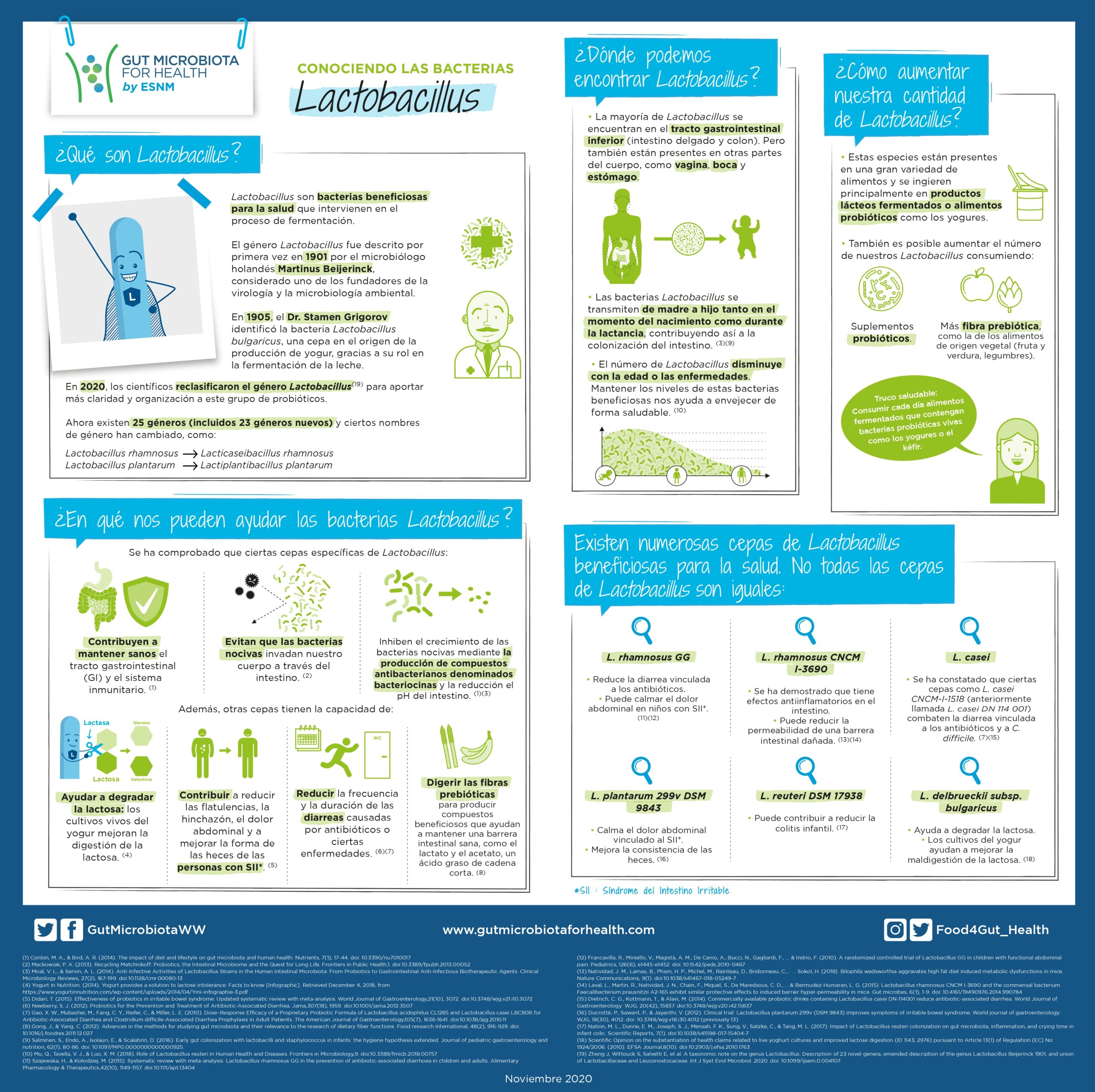Los lactobacilos son bacterias promotoras de la salud que forman parte de tu microbiota intestinal. También se pueden encontrar en alimentos fermentados probióticos.
Los beneficios para la salud de los lactobacilos incluyen:
- Apoyar la salud intestinal
- Apoyar un buen funcionamiento del sistema inmunológico
- Crear una barrera que previene el establecimiento de bacterias malas en el intestino.
- Contribuir a los mecanismos digestivos, transformando la fibra en metabolitos beneficiosos.
El género Lactobacillus se describió por primera vez en 1901. Hoy, en 2020, los científicos pueden identificar 25 géneros, incluidos 23 géneros nuevos establecidos por la nueva clasificación.
Muchos factores pueden tener un impacto en la diversidad y riqueza de la microbiota intestinal, incluida la edad y la medicación, que pueden afectar los niveles de lactobacilos. Una buena manera de mantener la población de lactobacilos en tu microbiota intestinal es incluir alimentos que contengan esta bacteria viva, como el yogur, o consumir fibras dietéticas prebióticas que se encuentran naturalmente en alimentos como las cebollas, el ajo y los plátanos, que estimulan el crecimiento de bacterias buenas.
El género Lactobacillus aporta beneficios básicos comunes, pero ciertos beneficios, sin embargo, pueden depender de la especie e incluso de la cepa. En nuestra nueva infografía actualizada sobre los Lactobacilos, encontrarás más información sobre los beneficios de las bacterias, cómo puedes aumentar tu diversidad en la microbiota intestinal y cómo se traducen los nombres de las bacterias en esta nueva clasificación.
¿Qué significa esto para ti? No mucho. Esas mismas bacterias probióticas permanecerán en tu comida. Este cambio es de nomenclatura y no afectará el etiquetado de sus productos en este momento, ya que cualquier cambio en las etiquetas puede tardar un año o más en ocurrir.
¡No dude en compartir esta infografía en redes sociales y con sus familiares y amigos!
Si le interesan las infografías, no se pierda las otras disponibles también en nuestra página:
- Cómo comer para fomentar una microbiota diversa
- Conozcamos mejor nuestra microbiota intestinal
- La evolución de la microbiota intestinal a lo largo de la vida en nuestra nueva infografía
- Bifidobacterias: las “heroínas de la salud” de la microbiota intestinal
- Alimentos fermentados y microbiota intestinal
- Sensiblidad alimentaria frente a la intolerancia alimentaria
- Descubra el papel esencial de la barrera intestinal en la salud
Referencias:
(1) Conlon, M. A., & Bird, A. R. (2014). The impact of diet and lifestyle on gut microbiota and human health. Nutrients, 7(1), 17-44. doi: 10.3390/nu7010017
(2) Mackowiak, P. A. (2013). Recycling Metchnikoff: Probiotics, the Intestinal Microbiome and the Quest for Long Life. Frontiers in Public Health,1. doi:10.3389/fpubh.2013.00052
(3) Moal, V. L., & Servin, A. L. (2014). Anti-Infective Activities of Lactobacillus Strains in the Human Intestinal Microbiota: From Probiotics to Gastrointestinal Anti-Infectious Biotherapeutic Agents. Clinical Microbiology Reviews, 27(2), 167-199. doi:10.1128/cmr.00080-13
(4) Yogurt in Nutrition. (2014). Yogurt provides a solution to lactose intolerance: Facts to know [Infographic]. Retrieved December 4, 2018, from https://www.yogurtinnutrition.com/wp-content/uploads/2014/04/Yini-infographie-3.pdf
(5) Didari, T. (2015). Effectiveness of probiotics in irritable bowel syndrome: Updated systematic review with meta-analysis. World Journal of Gastroenterology,21(10), 3072. doi:10.3748/wjg.v21.i10.3072
(6) Newberry, S. J. (2012). Probiotics for the Prevention and Treatment of Antibiotic-Associated Diarrhea. Jama,307(18), 1959. doi:10.1001/jama.2012.3507
(7) Gao, X. W., Mubasher, M., Fang, C. Y., Reifer, C., & Miller, L. E. (2010). Dose–Response Efficacy of a Proprietary Probiotic Formula of Lactobacillus acidophilus CL1285 and Lactobacillus casei LBC80R for Antibiotic-Associated Diarrhea and Clostridium difficile-Associated Diarrhea Prophylaxis in Adult Patients. The American Journal of Gastroenterology,105(7), 1636-1641. doi:10.1038/ajg.2010.11
(8) Gong, J., & Yang, C. (2012). Advances in the methods for studying gut microbiota and their relevance to the research of dietary fiber functions. Food research international, 48(2), 916-929. doi: 10.1016/j.foodres.2011.12.027
(9) Salminen, S., Endo, A., Isolauri, E., & Scalabrin, D. (2016). Early gut colonization with lactobacilli and staphylococcus in infants: the hygiene hypothesis extended. Journal of pediatric gastroenterology and nutrition, 62(1), 80-86. doi: 10.1097/MPG.0000000000000925.
(10) Mu, Q., Tavella, V. J., & Luo, X. M. (2018). Role of Lactobacillus reuteri in Human Health and Diseases. Frontiers in Microbiology,9. doi:10.3389/fmicb.2018.00757
(11) Szajewska, H., & Kołodziej, M. (2015). Systematic review with meta-analysis: Lactobacillus rhamnosus GG in the prevention of antibiotic-associated diarrhoea in children and adults. Alimentary Pharmacology & Therapeutics,42(10), 1149-1157. doi:10.1111/apt.13404
(12) Francavilla, R., Miniello, V., Magistà, A. M., De Canio, A., Bucci, N., Gagliardi, F., … & Indrio, F. (2010). A randomized controlled trial of Lactobacillus GG in children with functional abdominal pain. Pediatrics, 126(6), e1445-e1452. doi: 10.1542/peds.2010-0467
(13) Natividad, J. M., Lamas, B., Pham, H. P., Michel, M., Rainteau, D., Bridonneau, C., . . . Sokol, H. (2018). Bilophila wadsworthia aggravates high fat diet induced metabolic dysfunctions in mice. Nature Communications, 9(1). doi:10.1038/s41467-018-05249-7
(14) Laval, L., Martin, R., Natividad, J. N., Chain, F., Miquel, S., De Maredsous, C. D., … & Bermudez-Humaran, L. G. (2015). Lactobacillus rhamnosus CNCM I-3690 and the commensal bacterium Faecalibacterium prausnitzii A2-165 exhibit similar protective effects to induced barrier hyper-permeability in mice. Gut microbes, 6(1), 1-9. doi: 10.4161/19490976.2014.990784
(15) Dietrich, C. G., Kottmann, T., & Alavi, M. (2014). Commercially available probiotic drinks containing Lactobacillus casei DN-114001 reduce antibiotic-associated diarrhea. World Journal of Gastroenterology: WJG, 20(42), 15837. doi:10.3748/wjg.v20.i42.15837
(16) Ducrotté, P., Sawant, P., & Jayanthi, V. (2012). Clinical trial: Lactobacillus plantarum 299v (DSM 9843) improves symptoms of irritable bowel syndrome. World journal of gastroenterology: WJG, 18(30), 4012. doi: 10.3748/wjg.v18.i30.4012 (previously 13)
(17) Nation, M. L., Dunne, E. M., Joseph, S. J., Mensah, F. K., Sung, V., Satzke, C., & Tang, M. L. (2017). Impact of Lactobacillus reuteri colonization on gut microbiota, inflammation, and crying time in infant colic. Scientific Reports, 7(1). doi:10.1038/s41598-017-15404-7
(18) Scientific Opinion on the substantiation of health claims related to live yoghurt cultures and improved lactose digestion (ID 1143, 2976) pursuant to Article 13(1) of Regulation (EC) No 1924/2006. (2010). EFSA Journal,8(10). doi:10.2903/j.efsa.2010.1763
(19) Zheng J, Wittouck S, Salvetti E, et al. A taxonomic note on the genus Lactobacillus: Description of 23 novel genera, emended description of the genus Lactobacillus Beijerinck 1901, and union of Lactobacillaceae and Leuconostocaceae. Int J Syst Evol Microbiol. 2020. doi: 10.1099/ijsem.0.004107.


